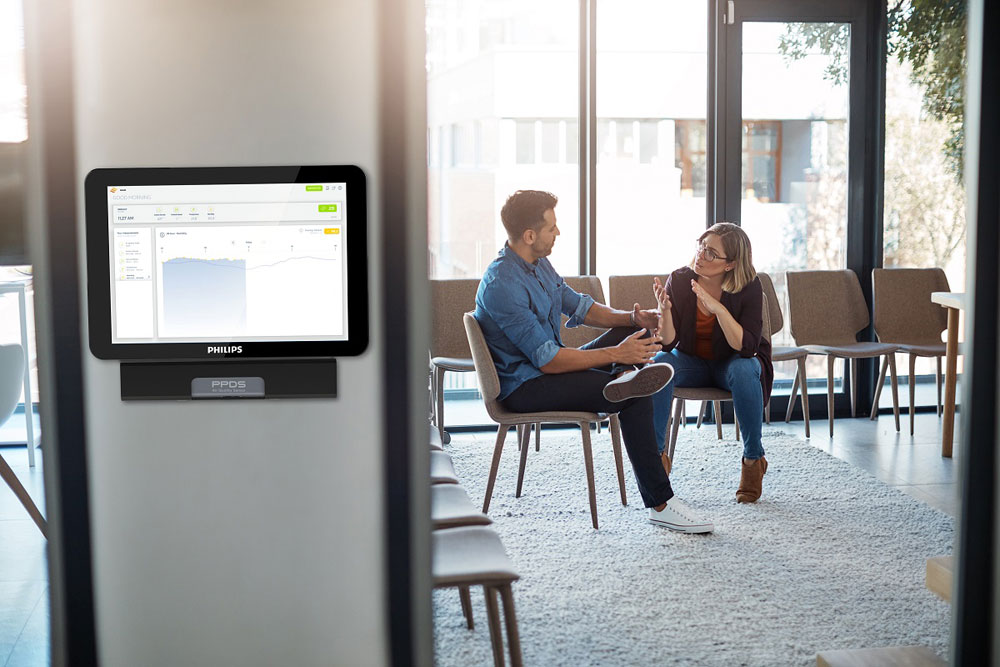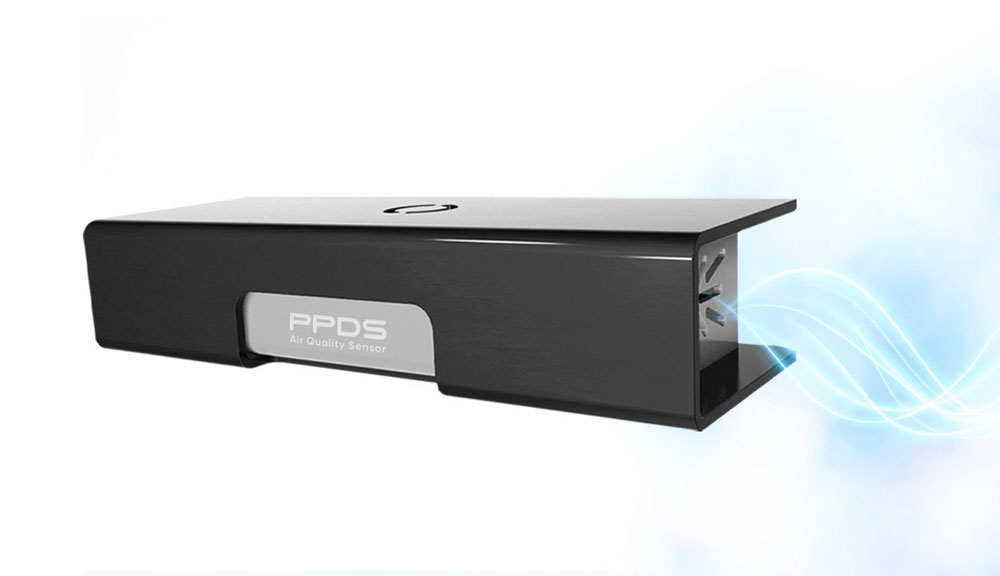PPDS is excited to announce the launch of Air Quality Sensor – a brand new, highly advanced and innovative air quality monitoring solution, designed exclusively to help schools and businesses (including corporate, retail and hospitality) create healthier and more productive working and learning environments, using Philips professional TVs, interactive displays and digital signage solutions.

Part of PPDS’ new ‘Total Solutions’ strategy and inspired by its relentless and continued efforts to rapidly bring new and relevant solutions to market when customers need them most (such as PeopleCount), the PPDS Air Quality Sensor extends the role and benefits of its digital displays, bringing extensive health and economic benefits.
View a video of a product demonstration.
Connected and powered by a single USB-A cable and compatible with PPDS’ latest Philips Professional TVs, digital signage and interactive displays – including MediaSuite (hospitality), T-Line (education), C-Line (corporate), B-Line (food and beverage / corporate), and Q-Line (universal) – the PPDS Air Quality Sensor ‘plug and play’ solution features four advanced sensors, which monitor air quality 24/7.
The four sensors measure room temperature, humidity, carbon dioxide and particulate matter, all of which can have a major impact on people’s health and wellbeing.
- Temperature: Influences virus infection rate and has an impact on performance in the classroom or workplace
- Humidity: Virus particles can remain highly infectious in humidity levels below 30% and above 55%
- Carbon dioxide: CO2 is an excellent indicator of indoor air quality and proper ventilation of a workspace or classroom
- Particulate matter: Higher levels of particle pollution can lead to greater risks of infections, not only COVID-19, but also other viral illnesses
Live data, whether for one PPDS Air Quality Sensor in a single room or building or installations across multiple sites, is analysed, translated and displayed in real time via an easily digestible dashboard and app – available anywhere at any time – with an indefinite archive of historical data available for extensive reporting and data analytics.
Whenever air quality is deemed to have fallen below a safe standard automatic alerts will be sounded, sent and displayed, providing opportunities to take immediate and necessary action. The app will even make tailored recommendations on improving the air quality based on its sensor readings, whether that’s something as simple as opening doors and windows, switching on air purifiers (if available), adjusting room temperatures, or even requesting that staff temporarily relocate to other areas of the building or from home.
Small in size, PPDS Air Quality Sensor can be easily and neatly installed/attached to Philips professional displays in any environment, using a specially designed bracket and assembly kit, supplied in the box.
Caring for your air
Chris Colpaert, General Manager at PPDS, commented: “With the spread of airborne viruses and other potentially harmful pollutants, monitoring indoor air quality is crucial to the health and safety of classrooms and work environments.
“PPDS Air Quality Sensor is a simple and incredibly effective solution that pairs perfectly with our advanced digital signage and professional TV solutions to bring safer and cleaner environments to people, whether they’re inside a classroom, corporate office, hotel room, a retail store, or any active indoor environment. Monitoring and managing air quality has never been more important, and we’ve made this a simple, seamless and affordable process.”
He added: “With the spread of airborne viruses and other potentially harmful pollutants, monitoring indoor air quality is crucial to the health and safety of classrooms and work environments. PPDS Air Quality Sensor is a simple solution that ensures you can return to the workplace or the classroom safely by monitoring, alerting and reporting on indoor air quality, and the solution fully integrates with your Philips professional display.”
Healthy building, healthy staff
Invisible to the eye, the quality of air being breathed in indoors has been proven to have a significant impact on a person’s wellbeing, affecting their short- and long-term health, reducing energy levels, focus, productivity and ability to process information.
Commonly described as ‘Sick Building Syndrome’ (SBS), poorly ventilated buildings can unknowingly be enhancing the risks and spread of common and highly infectious diseases and viruses, such as flu and bronchitis, while increasing the potential for staff absence and economic losses for both companies and staff.
According to the World Health Organization (WHO), symptoms of SBS can include headaches, dizziness, nausea, skin irritation, eye irritation, nose and throat irritation.
Poor health is estimated to costs U.S. employers $530 Billion a year and 1.4 Billion work days of absence and impaired performance, according to some reports.
Healthy body, healthy mind
For more sensitive groups, the quality of indoor air can contribute to serious and even life-threatening health conditions. It’s estimated that 3.8 million people around the world die every year as a result of indoor air pollution (including those working from home), with particulate matter (a mix of solid and liquid droplets found in the air) the cause of numerous respiratory ailments including asthma, respiratory inflammation, decreased lung function, and cancer. People who spend significant time in poorly ventilated rooms also have a 50 per cent higher risk of developing allergies, while prolonged stress can impair the immune system and lead to heart attack, cancer, arthritis, dementia, neuro-degenerative diseases and death.
With statistics showing people spend around 90 per cent of their time indoors, and the quality of air inside homes and buildings anywhere between five and one hundred times more polluted than outdoors, air quality management has never been more critical.
Available as a standalone purchase or as part of a bundled package, PPDS Air Quality Sensor, combined with PPDS’ range of compatible Philips professional displays, makes this process a fast and simple one.
Colpaert said: “As a business, you can’t control what your staff, customers and students are exposed to in their personal life. However, with PPDS Air Quality Sensor on our Philips professional displays, you are able to play an important role, not only for the wellbeing of your workforce, but to society as whole, in providing them with a clean and healthy environment, with the vision and ability to react quickly if conditions deteriorate.”
Supporting staff and society
“Over the past 12 months or so, the world has changed both in our personal and our work lives. Our focus on health and hygiene is something that has never been more relevant nor more scrutinised. As normality returns, it’s more important than ever that the environment we are in is safe” said Colpaert.
 Martijn van der Woude, Director International Business Development at PPDS, continued: “Like airborne viruses, the quality of air, (unless at very extreme levels) is not visible to the naked eye. This can be dangerous as it can easily become something that’s not considered, maybe even ignored. The risks are there, though, and they can pose a significant danger, both in the immediate and, perhaps more concerning, the long-term future. Being aware of these risks, taking preventative measures and, reassuringly, letting people know that their health is being taken seriously, is something that brings untold benefits – including reputationally.”
Martijn van der Woude, Director International Business Development at PPDS, continued: “Like airborne viruses, the quality of air, (unless at very extreme levels) is not visible to the naked eye. This can be dangerous as it can easily become something that’s not considered, maybe even ignored. The risks are there, though, and they can pose a significant danger, both in the immediate and, perhaps more concerning, the long-term future. Being aware of these risks, taking preventative measures and, reassuringly, letting people know that their health is being taken seriously, is something that brings untold benefits – including reputationally.”
He concluded: “The statistics and impact on people’s health simply cannot be ignored and businesses, schools, retailers and the hospitality sector have a chance to reset and understand the clear link between poor air quality, absence and performance. It’s never been more important to have a healthy, happy and energetic people. The PPDS Air Quality Sensor is just the beginning of this story and we are continuing to develop our air quality solutions around our Philips professional displays. Watch this space….”










